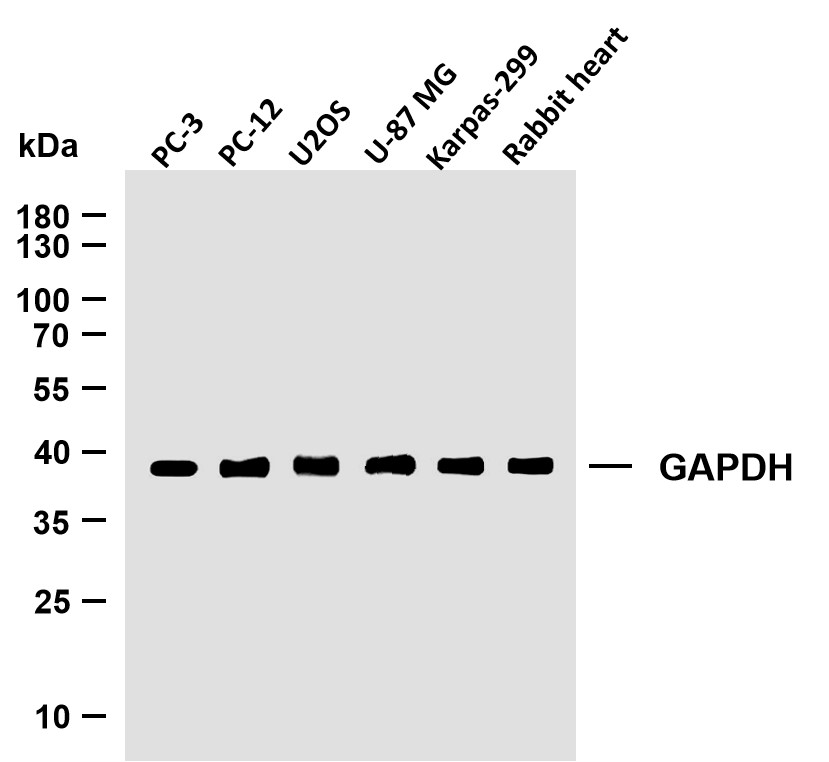
Catalog: YT3189
Size
Price
Status
Qty.
200μL
$450.00
In stock
0
100μL
$280.00
In stock
0
40μL
$150.00
In stock
0
Add to cart


Collected


Collect
Main Information
Target
Nrf2
Host Species
Rabbit
Reactivity
Human, Mouse, Rat
Applications
WB, IHC, IF, ELISA
MW
68kD (Calculated)
90-100kD (Observed)
Conjugate/Modification
Unmodified
Detailed Information
Recommended Dilution Ratio
WB 1:500-1:2000; IHC 1:100-1:300; IF 1:200-1:1000; ELISA 1:40000; Not yet tested in other applications.
Formulation
Liquid in PBS containing 50% glycerol, 0.5% BSA and 0.02% sodium azide.
Specificity
Nrf2 Polyclonal Antibody detects endogenous levels of Nrf2 protein.
Purification
The antibody was affinity-purified from rabbit antiserum by affinity-chromatography using epitope-specific immunogen.
Storage
-15°C to -25°C/1 year(Do not lower than -25°C)
Concentration
1 mg/ml
MW(Calculated)
68kD
MW(Observed)
90-100kD
Modification
Unmodified
Clonality
Polyclonal
Isotype
IgG
RRID
AB_3076284
Related Products
Antigen&Target Information
Immunogen:
The antiserum was produced against synthesized peptide derived from human Nrf2. AA range:556-605
show all
Specificity:
Nrf2 Polyclonal Antibody detects endogenous levels of Nrf2 protein.
show all
Gene Name:
NFE2L2 NRF2
show all
Protein Name:
Nuclear factor erythroid 2-related factor 2
show all
Other Name:
NFE2L2 ;
NRF2 ;
Nuclear factor erythroid 2-related factor 2 ;
NF-E2-related factor 2 ;
NFE2-related factor 2 ;
HEBP1 ;
Nuclear factor ;
erythroid derived 2, like 2
NRF2 ;
Nuclear factor erythroid 2-related factor 2 ;
NF-E2-related factor 2 ;
NFE2-related factor 2 ;
HEBP1 ;
Nuclear factor ;
erythroid derived 2, like 2
show all
Database Link:
Background:
This gene encodes a transcription factor which is a member of a small family of basic leucine zipper (bZIP) proteins. The encoded transcription factor regulates genes which contain antioxidant response elements (ARE) in their promoters; many of these genes encode proteins involved in response to injury and inflammation which includes the production of free radicals. Multiple transcript variants encoding different isoforms have been characterized for this gene. [provided by RefSeq, Sep 2015],
show all
Function:
Domain:Acidic activation domain in the N-terminus, and DNA binding domain in the C-terminus.,Function:Transcription activator that binds to antioxidant response (ARE) elements in the promoter regions of target genes. Important for the coordinated up-regulation of genes in response to oxidative stress. May be involved in the transcriptional activation of genes of the beta-globin cluster by mediating enhancer activity of hypersensitive site 2 of the beta-globin locus control region.,PTM:Phosphorylation of Ser-40 by PKC in response to oxidative stress dissociates NFE2L2 from its cytoplasmic inhibitor KEAP1, promoting its translocation into the nucleus.,similarity:Belongs to the bZIP family.,similarity:Belongs to the bZIP family. CNC subfamily.,similarity:Contains 1 bZIP domain.,subcellular location:Cytosolic under unstressed conditions, translocates into the nucleus upon induction by electrophilic agents.,subunit:Heterodimer. May bind DNA with an unknown protein. Interacts with KEAP1. Interacts via its leucine-zipper domain with the coiled-coil domain of PMF1.,tissue specificity:Widely expressed. Highest expression in adult muscle, kidney, lung, liver and in fetal muscle.,
show all
Cellular Localization:
Cytoplasm, cytosol . Nucleus . Cytosolic under unstressed conditions: ubiquitinated and degraded by the BCR(KEAP1) E3 ubiquitin ligase complex (PubMed:15601839, PubMed:21196497). Translocates into the nucleus upon induction by electrophilic agents that inactivate the BCR(KEAP1) E3 ubiquitin ligase complex (PubMed:21196497). .
show all
Tissue Expression:
Research Areas:
>>Protein processing in endoplasmic reticulum ;
>>Parkinson disease ;
>>Pathways in cancer ;
>>Chemical carcinogenesis - reactive oxygen species ;
>>Hepatocellular carcinoma ;
>>Lipid and atherosclerosis ;
>>Fluid shear stress and atherosclerosis
>>Parkinson disease ;
>>Pathways in cancer ;
>>Chemical carcinogenesis - reactive oxygen species ;
>>Hepatocellular carcinoma ;
>>Lipid and atherosclerosis ;
>>Fluid shear stress and atherosclerosis
show all
Signaling Pathway
Reference Citation({{totalcount}})
Catalog: YT3189
Size
Price
Status
Qty.
200μL
$450.00
In stock
0
100μL
$280.00
In stock
0
40μL
$150.00
In stock
0
Add to cart


Collected


Collect
Recently Viewed Products
Clear allPRODUCTS
CUSTOMIZED
ABOUT US
Toggle night Mode
{{pinfoXq.title || ''}}
Catalog: {{pinfoXq.catalog || ''}}
Filter:
All
{{item.name}}
{{pinfo.title}}
-{{pinfo.catalog}}
Main Information
Target
{{pinfo.target}}
Reactivity
{{pinfo.react}}
Applications
{{pinfo.applicat}}
Conjugate/Modification
{{pinfo.coupling}}/{{pinfo.modific}}
MW (kDa)
{{pinfo.mwcalc}}
Host Species
{{pinfo.hostspec}}
Isotype
{{pinfo.isotype}}
Product {{index}}/{{pcount}}
Prev
Next
{{pvTitle}}
Scroll wheel zooms the picture
{{pvDescr}}






















